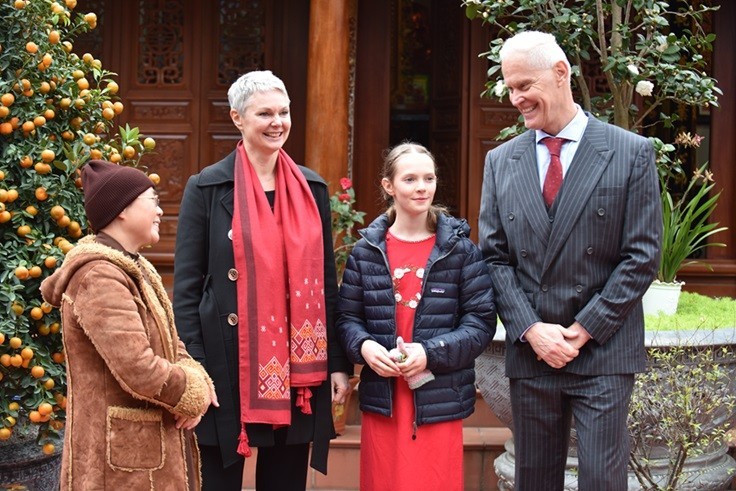
Vietnam’s participation in UNPKO: Responsibility towards the international community for a peaceful common future
Latest
| TIN LIÊN QUAN | |
| Vietnam voices support for UN chief's efforts to maintain international peace | |
| Vietnam supports UN peace plan for Yemen: Ambassador Dang Dinh Quy | |
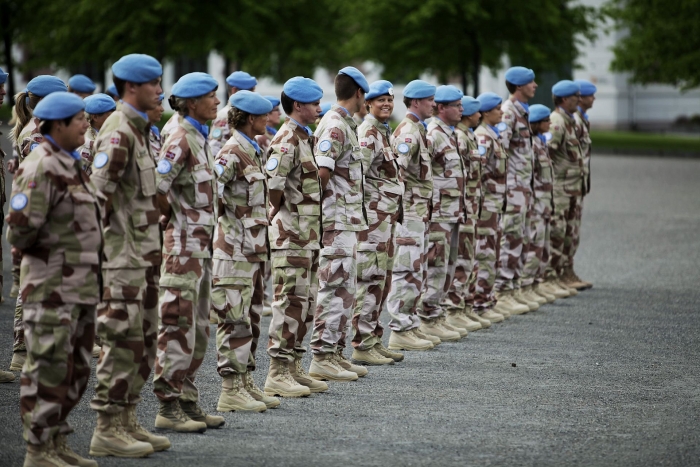 |
| Vietnam and Norway support the role of women in all phases of the peace process and in UN peacekeeping activities. (Photo: Norway Embassy) |
When it comes to gender equality, Norway is a leading country. What has Norway done to promote women’s participation in the armed forces in general and peace operations in particular?
Norway has a proud history of pioneering the advancement of women. Women were given the same rights as men to vote in 1913. Norway also has one of the highest rates in the world for women’s participation in the workforce; women 67.5% and men 73.4% in 2019. We had the world’s first female submarine commander in 1992, the first female Chief of the Air Force and the first female UN Force Commander, Major General Kristin Lund.
We have had several female Ministers of Defence - the first one was appointed in 1999. All these women are serving as very important role models for other girls and women in seeking opportunities and ensuring gender equality within the armed forces. In 2015, we got universal compulsory military service. The main argument is that the armed forces need to be able to recruit among the most capable candidates. We cannot exclude half of the population in this recruitment process.
Despite these encouraging facts, achievements did not happen overnight or without a struggle. For example, the first suggestion to change the constitution so that women could vote came in 1886, but it took 27 more years before this right was granted to all women in Norway. We still have much to improve.
We need a better gender balance in many professions and workplaces, including the military and the police, as well as in senior management positions. Sexual and gender-based violence and harassment is still a challenge at all levels of our society. Covid-19 pandemic has actually become a conflict multiplier when it comes to domestic violence not only in Norway but globally.
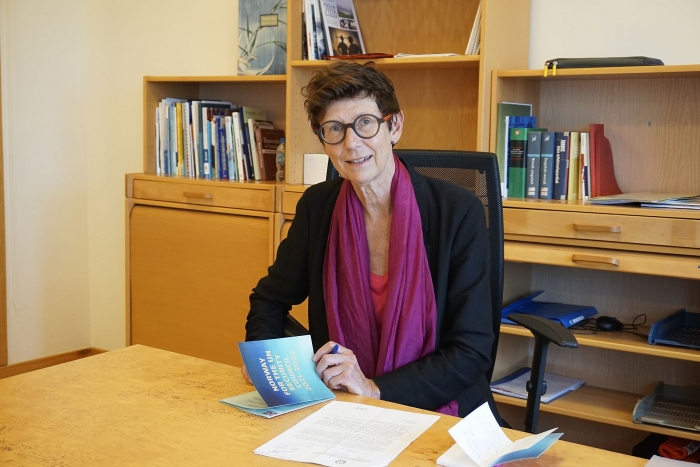 |
| Norway Ambassador to Vietnam Grete Lochen. (Photo: Norway Embassy) |
Norway has also been active in UN-led peacekeeping operations. UN’s first female commander of a peacekeeping force, Major General Kristin Lund, is a Norwegian. Vietnam also focuses on promoting women’s participation in the UN peacekeeping operations (UNPKO), do you have anything to share about Norway’s perspectives on promoting women’s participation in peacekeeping operations?
First of all, I would like to commend Vietnam for its contributions to the UN Peacekeeping Operations in South Sudan and the Central African Republic. Being a new troop sending country to the UN peacekeeping operations Vietnam thereby reaffirms its commitment and responsibilities in the international community.
As for my country, Norway has a long and rich history as one of the founding members of the United Nations (UN). For more than 70 years, Norway has been a strong supporter of a strong and efficient UN and a rule-based international order with the UN at its core. As a consistent partner, Norway is the seventh-largest contributor to the UN system, and one of the very few countries that spend 1% of the National Gross Income on development. With a very small population (over 5.3 million people), more than 40,000 Norwegians have served in UN-led peacekeeping operations since 1949, including currently in South Sudan, the Middle East and Mali.
Like Vietnam, Norway sees many benefits from having women’s participation in UN Peacekeeping Operations (UNPKO). Peacekeeping operations have developed from military monitoring operations to become increasingly complex operations with significant peacebuilding elements. Civilians are often targeted in modern conflicts. Sexual and gender-based violence is used as a tactic of war or terrorism. Women peacekeepers are important in terms of operationalizing the gender perspective in operations and missions.
In some contexts, it may be easier for women personnel to establish contact with and gain access to local communities dominated by women. This leads to broader perspectives and a broader understanding of the situation. Having a high percentage of women in operations and missions can thus help to increase trust and success. Likewise, nor should the effect that meeting women in uniform has on local women police officers or military personnel be underestimated.
| Read more |
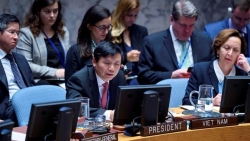 Vietnam voices support for UN chief's efforts to maintain international peace Vietnam voices support for UN chief's efforts to maintain international peace |
Greater diversity means improved decision‐making, planning and results, leading to greater operational effectiveness and performance. Diversity in UNPKO allows engagement with all members of the communities we are there to protect. In all fields of peacekeeping, women have proven that they can perform the same roles, to the same standards and under the same difficult conditions, as their male counterparts. We must take note that women in the peacekeeping missions are not alone responsible for systematically integrating the gender perspective. The mission itself and its leadership must have ownership and take a systematic approach. However, more women in peacekeeping mean more inclusive and sustainable peace.
That is why we should recruit and retain female peacekeepers. In 2000, 20 years ago the UN Security Council (UNSC) issued Resolution 1325 on Women, Peace and Security, which highlighted a shift in UN policy to engage more women in peacekeeping operations around the world. It affirmed the role of women in the prevention and resolution of conflicts, negotiations, peacekeeping, humanitarian responses and post-conflict reconstruction. Further, it stressed the need to integrate a gender perspective in these areas, including in peacekeeping operations.
A watershed moment in the decades-long history of UNPKO occurred on 12 May 2014, when Major General Kristin Lund of Norway was appointed as the first woman to serve as Force Commander in the UN Peacekeeping Force in Cyprus. General Lund’s appointment is a major acknowledgment of the implementation of UNSC Resolution 1325 in peacekeeping operations.
As soon as she was appointed, Major General Lund said “...it is time and it is important that other women see that it's possible also in the UN system to get up in the military hierarchy to become a force commander”. Since then, gender has always been on the top of her agenda. She initiated a female military network, engaged women to become more visible and increased the number of female observers. She also mandated that the all-male teams in military skills competitions had to have females. She has become an important role model and champion for the UN, gender and leadership.
It is encouraging to see an increasing rate of women’s participation in UNPKO. In 1993, only 1% of all deployed uniformed personnel were women. By 2012, women made up 3% of military and 10% of police personnel in UN peacekeeping operations. Currently, women account for almost 30 percent of the international civilians working in peacekeeping and special protection missions. We need to be ambitious. As part of its Action for Peacekeeping initiative, the UN Secretariat and the Member States collectively committed to increasing the number of civilian and uniformed women in peacekeeping at all levels and in key positions.
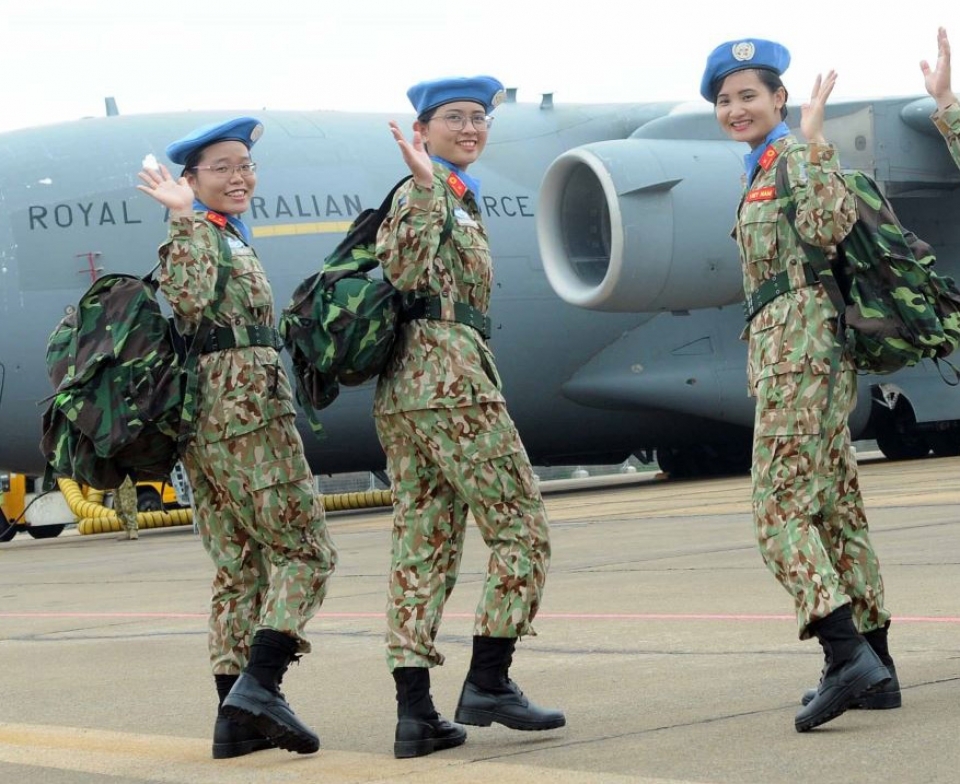 |
| Vietnam is a new troop sending country to the UNPKO (since 2014) but is increasingly getting more active. (Photo: QT) |
In 2014, Vietnam started to deploy military officers to UNPKO missions in South Sudan and Central Africa. As a Vietnam’s active supporter in this, how would you assess the effectiveness of Vietnam’s deployment of forces to these missions? What would you say about Vietnam’s efforts in increasing women’s representation in UNPKO?
I would like to congratulate Vietnam on having recently your first officer to fill a UN military officer vacancy at the UN Department of Peace Operations in New York, Lieutenant Colonel Luong Truong Vinh.
Vietnam is a new troop sending country to the UNPKO (since 2014) but is increasingly getting more active. Globally, Vietnam exchanges high-level military delegations to the UN headquarters and field missions. Regionally, Vietnam participates in the regional expert groups on peacekeeping and cooperates with countries in the region on combined peacekeeping and humanitarian activities.
Vietnam’s participation in UNPKO has demonstrated the country’s responsibility towards the international community. In June 2018, the UN recognized the Vietnam Department of Peacekeeping Operations as one of four international training centers in the region and agreed to carry out training under a three-party partnership (comprising Vietnam, the UN and a partner country). This reflects the UN's appreciation of Vietnam's commitment and contributions to UN peacekeeping missions.
I am also happy to see Vietnam’s strong support for the UNSC resolutions on the role of women in all phases of the peace process and in UN peacekeeping activities. Vietnam shows the responsibilities and actively supports UN initiatives, particularly on issues related to gender equality, women empowerment and prevention of sexual abuse and exploitation. Vietnam is also committed to increasing the rate of women participating UN peacekeeping operations, both individually and by contingent. All this is highly appreciated. Let keep up your good work!
| Read more |
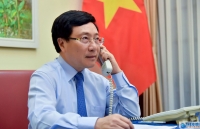 Vietnam, Norway vow to promote bilateral cooperation to overcome COVID-19 impacts Vietnam, Norway vow to promote bilateral cooperation to overcome COVID-19 impacts |
Vietnam is planning to send engineering and police forces to take part in UNPKO; does Norway have any experience to share with Vietnam on this? What do you think about the cooperation opportunities between Vietnam and Norway in UNPKO, Ambassador?
Police play a very important role in UNPKO. Developments in recent years have shown how crime and armed conflict overlap. This makes crises and conflicts more unpredictable. The military and the police need to cooperate closely in order to find expedient ways of dealing with situations. Sexual violence in armed conflicts constitutes serious abuse. Research has shown that this kind of violence does not necessarily decrease after a conflict has ended. It is therefore necessary that preventive measures are based on a long-term perspective. It is necessary to be aware of this issue in the period prior to, during and after a conflict.
For the Norwegian police service, preventing and dealing with sexual violence is an integral part of the national approach. These issues are part of our police training. We have a lot of experience to share with Vietnam and others, including the importance of involving women police officers in peacekeeping operations. The police are a core component in these operations, whether by working directly to protect civilians or by building the capacity of local police and thereby helping to ensure that abuse and other criminal offenses are prevented, investigated and prosecuted.
I believe such international multilateral institutions like the UNPKO or any UN-led mechanisms would provide member countries with unique opportunities to learn from each other. As you know, Norway is also seeking a seat as a non-permanent elected member of the UN Security Council (UNSC) for the period 2021 - 2022. We hope that we would have a chance to work with Vietnam for one year in the Security Council. We have a lot of common interests and it will give us even more opportunities to work closely together on issues such as women, peace and security. It’s all about our common future and that global challenges require global solutions. We are all experiencing this very clearly during this unsettling time due to the Covid-19.
On this international day of UN peacekeepers, we pay tribute to all the women and men who have served as military, police, or civilians in UNPKO. We commend their professionalism, dedication, and courage, and honor the memory of those who have lost their lives in the cause of peace. Let’s work together to promote a peaceful common future.
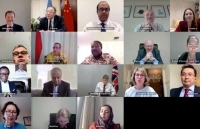 | Vietnam affirms support of for peace process led by Afghanistan people Vietnam has reaffirmed support for peace process led by Afghan people at the United Nations Security Council (UNSC)'s teleconference on March 31 discussing Afghanistan situation ... |
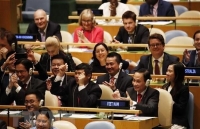 | Vietnam ready for contribute to int'l efforts for peace, security Prime Minister Nguyen Xuan Phuc has written an article entitled “Partnership for sustainable peace: Vietnam stands ready to make active contributions to international efforts for ... |
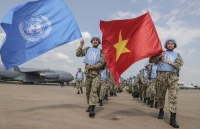 | Joining UN peacekeeping missions affirms VN’s contributions to world peace Vietnam’s participation in the United Nations’ peacekeeping missions is a humanitarian activity of great significance, affirming the country’s responsibility towards the international community. |






